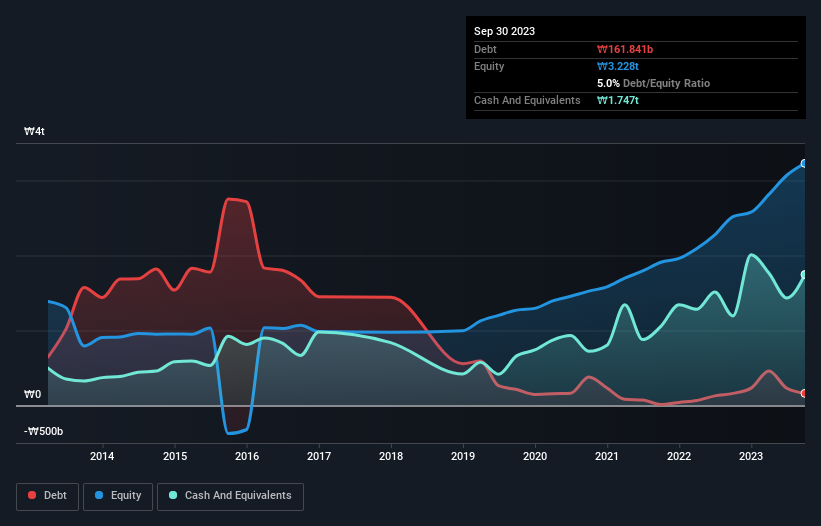- South Korea
- /
- Construction
- /
- KOSE:A028050
Samsung Engineering (KRX:028050) Seems To Use Debt Rather Sparingly

Howard Marks put it nicely when he said that, rather than worrying about share price volatility, 'The possibility of permanent loss is the risk I worry about... and every practical investor I know worries about.' It's only natural to consider a company's balance sheet when you examine how risky it is, since debt is often involved when a business collapses. We can see that Samsung Engineering Co., Ltd. (KRX:028050) does use debt in its business. But is this debt a concern to shareholders?
When Is Debt A Problem?
Debt assists a business until the business has trouble paying it off, either with new capital or with free cash flow. In the worst case scenario, a company can go bankrupt if it cannot pay its creditors. However, a more common (but still painful) scenario is that it has to raise new equity capital at a low price, thus permanently diluting shareholders. Of course, debt can be an important tool in businesses, particularly capital heavy businesses. The first thing to do when considering how much debt a business uses is to look at its cash and debt together.
Check out our latest analysis for Samsung Engineering
How Much Debt Does Samsung Engineering Carry?
The chart below, which you can click on for greater detail, shows that Samsung Engineering had ₩161.8b in debt in September 2023; about the same as the year before. But it also has ₩1.75t in cash to offset that, meaning it has ₩1.58t net cash.

A Look At Samsung Engineering's Liabilities
According to the last reported balance sheet, Samsung Engineering had liabilities of ₩4.04t due within 12 months, and liabilities of ₩287.2b due beyond 12 months. On the other hand, it had cash of ₩1.75t and ₩1.63t worth of receivables due within a year. So its liabilities outweigh the sum of its cash and (near-term) receivables by ₩952.9b.
Given Samsung Engineering has a market capitalization of ₩5.10t, it's hard to believe these liabilities pose much threat. However, we do think it is worth keeping an eye on its balance sheet strength, as it may change over time. While it does have liabilities worth noting, Samsung Engineering also has more cash than debt, so we're pretty confident it can manage its debt safely.
On top of that, Samsung Engineering grew its EBIT by 58% over the last twelve months, and that growth will make it easier to handle its debt. The balance sheet is clearly the area to focus on when you are analysing debt. But ultimately the future profitability of the business will decide if Samsung Engineering can strengthen its balance sheet over time. So if you want to see what the professionals think, you might find this free report on analyst profit forecasts to be interesting.
Finally, a company can only pay off debt with cold hard cash, not accounting profits. Samsung Engineering may have net cash on the balance sheet, but it is still interesting to look at how well the business converts its earnings before interest and tax (EBIT) to free cash flow, because that will influence both its need for, and its capacity to manage debt. During the last three years, Samsung Engineering produced sturdy free cash flow equating to 57% of its EBIT, about what we'd expect. This free cash flow puts the company in a good position to pay down debt, when appropriate.
Summing Up
While Samsung Engineering does have more liabilities than liquid assets, it also has net cash of ₩1.58t. And it impressed us with its EBIT growth of 58% over the last year. So we don't think Samsung Engineering's use of debt is risky. When analysing debt levels, the balance sheet is the obvious place to start. But ultimately, every company can contain risks that exist outside of the balance sheet. Case in point: We've spotted 2 warning signs for Samsung Engineering you should be aware of.
If you're interested in investing in businesses that can grow profits without the burden of debt, then check out this free list of growing businesses that have net cash on the balance sheet.
New: Manage All Your Stock Portfolios in One Place
We've created the ultimate portfolio companion for stock investors, and it's free.
• Connect an unlimited number of Portfolios and see your total in one currency
• Be alerted to new Warning Signs or Risks via email or mobile
• Track the Fair Value of your stocks
Have feedback on this article? Concerned about the content? Get in touch with us directly. Alternatively, email editorial-team (at) simplywallst.com.
This article by Simply Wall St is general in nature. We provide commentary based on historical data and analyst forecasts only using an unbiased methodology and our articles are not intended to be financial advice. It does not constitute a recommendation to buy or sell any stock, and does not take account of your objectives, or your financial situation. We aim to bring you long-term focused analysis driven by fundamental data. Note that our analysis may not factor in the latest price-sensitive company announcements or qualitative material. Simply Wall St has no position in any stocks mentioned.
About KOSE:A028050
Samsung E&A
Provides a range of engineering services for plant and other construction in South Korea, the United States, Asia, the Middle East, and internationally.
Very undervalued with flawless balance sheet.
Market Insights
Community Narratives





